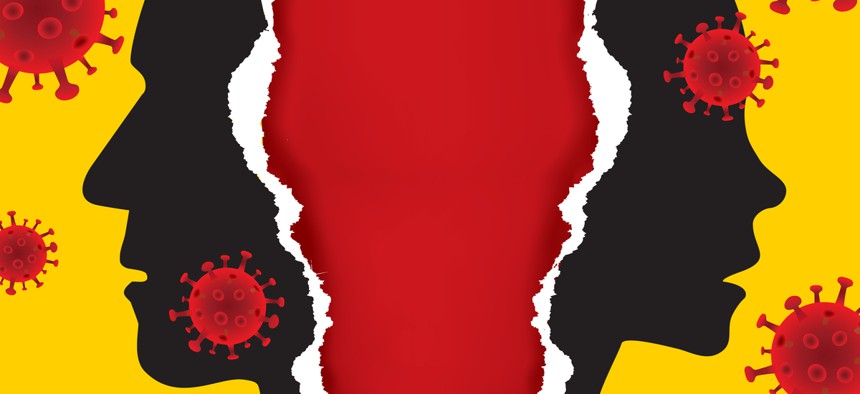Trump Orders Agencies to Tackle Coronavirus-Related Mental Health Challenges

jiris/Shutterstock.com
A multi-agency working group must develop a plan within 45 days.
President Trump issued an executive order on Monday to establish a multi-agency working group to address mental health issues resulting from the novel coronavirus pandemic.
According to a poll from the Kaiser Family Foundation in mid-July, 53% of U.S. adults said their mental health was harmed by worry and stress over the coronavirus, compared to 32% in March. The pandemic and the resulting economic recession have “disproportionately” affected young adults (ages 18-24), racial and ethnic minorities, unpaid adult caretakers and essential workers in terms of mental health challenges, substance abuse and thoughts of suicide, according to a report from the Centers for Disease Control and Prevention in September. The president issued the order––that included a “national call to action” to remedy these issues––before leaving Walter Reed National Military Medical Center where he was being treated for coronavirus.
“The pandemic has...exacerbated mental and behavioral health conditions as a result of stress from prolonged lockdown orders, lost employment and social isolation,” said the directive. “We must enhance the ability of the federal government, as well as its state, local and tribal partners, to appropriately address these ongoing mental- and behavioral-health concerns.”
The order creates a working group that will be co-chaired by the Health and Human Services Department secretary and assistant to the president for domestic policy (or their designees). There will be representatives from the Defense, Justice, Agriculture, Labor, Housing and Urban Development, Education and Veterans Affairs departments; Small Business Administration; Office of National Drug Control Policy; Office of Management and Budget; and any other agencies the co-chairs seek.
The group will examine mental and behavioral conditions among vulnerable populations affected by the pandemic (such as minorities, seniors, small business owners, veterans, those with disabilities, individuals with substance use disorders and people possibly affected by domestic violence or physical abuse) and determine how pre-existing protocols and programs may help them.
Specifically, the group will look at how the veterans’ suicide prevention program (established in a March 2019 executive order) and the Labor Department’s online toolkit to help employers better understand their employees’ mental health challenges and how centralized accommodation program resources for disability inclusion in the workplace can be applied.
Within 45 days of the order, the group must create and submit a report to the president that details a plan to enhance the coordination among the relevant federal agencies and partners in the private sector “to assist individuals in crisis, so that they receive effective treatment and recovery services.”
Additionally, the executive order says that the heads of agencies will work with OMB to review their current grant programs for mental health services and encourage grantees to provide in-person, telehealth and group therapy sessions. Agencies should also “maximize” the contracts or grants to bolster outreach, education and case management programs to address mental health challenges and suicide prevention for vulnerable individuals.
The president noted in the order that his new initiative builds on the “billions of dollars and thousands of hours in resources to help Americans” that the federal government has provided during the pandemic, which include $425 million in emergency funds for the Substance Abuse and Mental Health Services Administration.
NEXT STORY: Quick Hits






